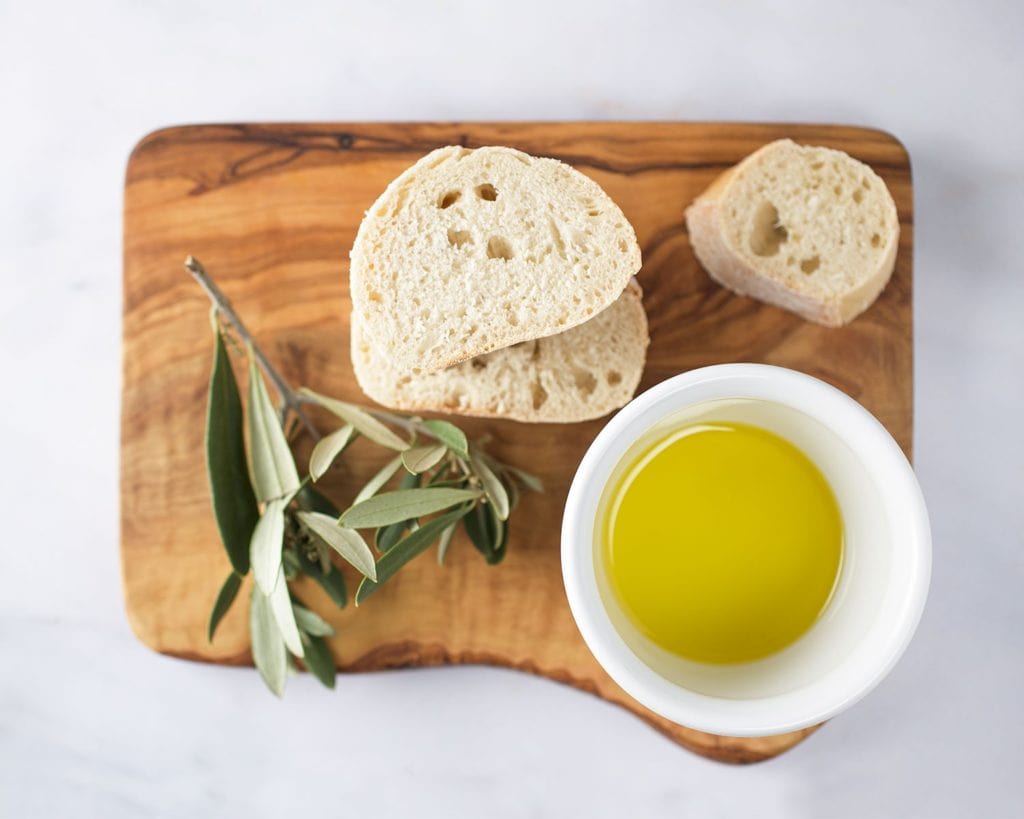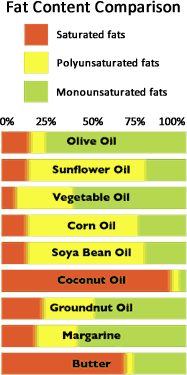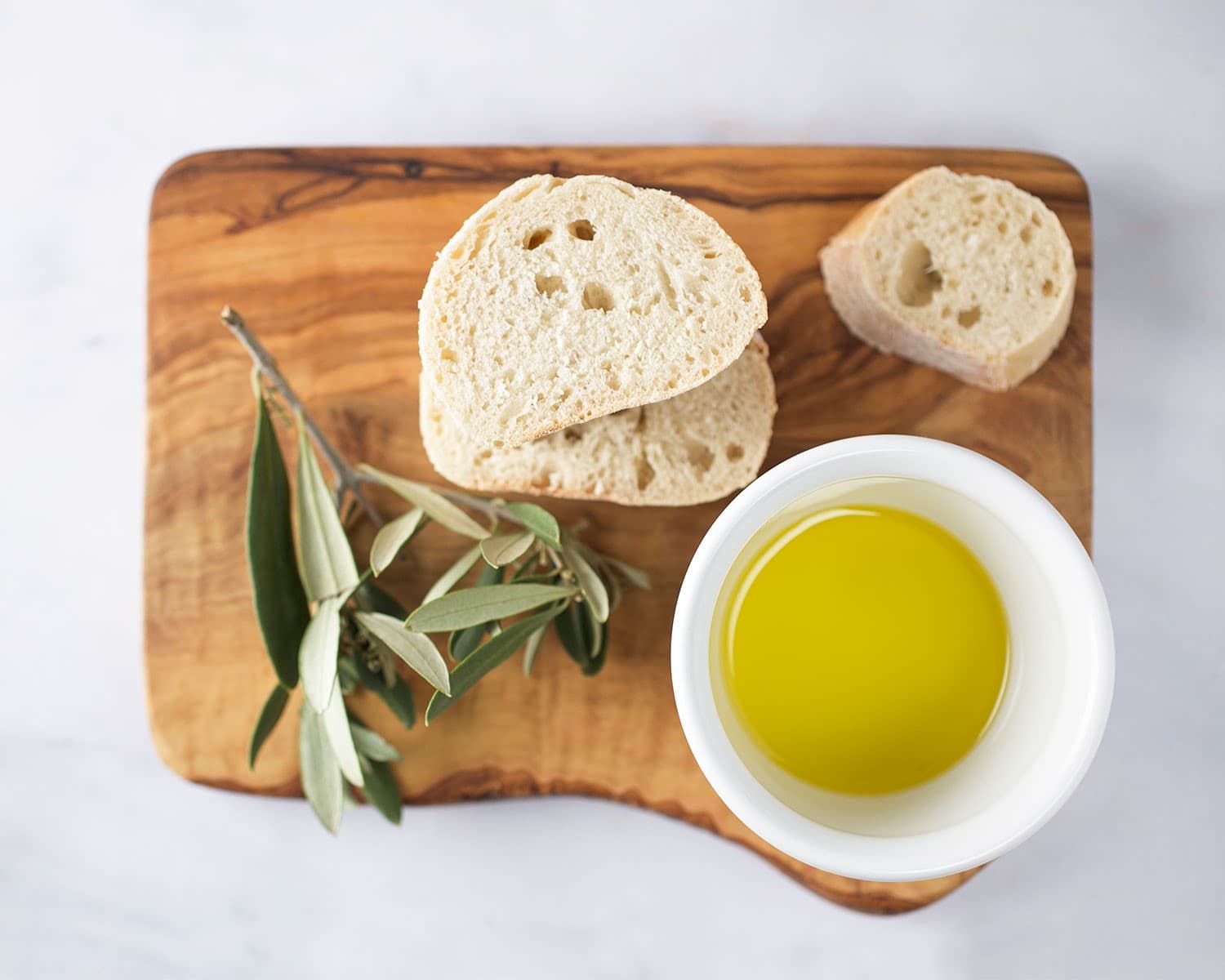The Food & Drug Administration approves new qualified health claims for consuming extra virgin olive oil with high levels of oleic acid to reduce coronary heart disease risk.

Summary:
CONTENTS
- Health Benefits Of Extra Virgin Olive Oil : The View From Europe
- The Importance Of Oleic Acid In Extra Virgin Olive Oil
- Not All Fats Are The Same.
- Extra Virgin Olive Oil & The FDA
Health Benefits Of Extra Virgin Olive Oil : The View From Europe
Extra virgin olive oil is probably the most extensively researched foodstuff on the planet and the health benefits of consuming extra virgin olive oil, whether taken on its own or including extra virgin olive oil in cooking, are evidence based. Thanks to the recent spotlight on the Mediterranean Diet, extensive research has been done on the phytonutrient composition of olive oil.
The European Food Safety Authority has for some time already approved health claims for extra virgin olive oils with polyphenol content of more than 250mg / kg. Polyphenols are a potent antioxidant, one that protects against damaging molecules in your body called free radicals. Free radicals can ricochet around inside your body and harm good cells. Antioxidants, such as the polyphenols found in extra virgin olive oil, work to neutralize free radicals and so protect the body at a cellular level.
Morocco Gold contains polyphenols well above the level quoted by the Food Safety Authority.
The Importance Of Oleic Acid In Extra Virgin Olive Oil
Unlike the EFSA, the FDA have focused their recommendations not on polyphenol levels but on the right kind of fat, in particular the mono-unsaturated fat – oleic acid. As far back a 2010, researches Sergio Lopez and Francisco J.G. Muriana reported:
Evidence from epidemiological studies suggests that a higher proportion of monounsaturated fatty acids (MUFA), notably oleic acid, in the diet is linked with a reduction in the risk of coronary heart disease (CHD). To achieve this benefit, olive oil as a major source of oleic acid is to replace a similar amount of saturated fat and not increase the total number of daily calories.
The biochemical bases of the ameliorative effect of oleic acid are thought to be modification of plasma lipid and lipoprotein concentrations, inhibition of coagulation, improvement of glucose homeostasis, and attenuation of inflammation and oxidative status in fasting conditions.
Olives and Olive Oil in Health and Disease Prevention
Not All Fats Are The Same.
Dietary fats are an essential part of a healthy diet according to the American Heart Association. The right fats provide energy, improve cell growth and absorption of nutrients, and create important hormones. Not only does extra virgin olive oil like Morocco Gold consist mainly of healthy monounsaturated fats, it is also the only fat that contains high levels of polyphenols, the antioxidants associated with a range of health benefits. This makes extra virgin olive oil without question the healthiest of all fats and an essential part of a healthy diet.
To remain healthy, we need moderate amounts of the right type of fats eaten as part of a good, balanced healthy diet. However, a high fat intake and in particular, a high intake of saturated fats is associated with raised blood cholesterol and coronary heart disease.
Which Fats Contribute To A Healthy Diet
Fats are made up of fatty acids and glycerol. A fatty acid consists of a chain of carbon atoms, where each carbon atom in the chain is attached to hydrogen atoms. The number of hydrogen atoms per carbon atom determines whether the fatty acid is saturated or unsaturated and therefore will contribute towards a healthy diet.
Saturated fats
If a fatty acid has all of the hydrogen atoms it can hold (2 per carbon atom in the chain) and all of the carbon atoms in the chain are linked by single bonds, it is described as saturated.
Saturated fats are usually solid or semi-solid at room temperature and are strongly associated with raised blood cholesterol which is why nutritionists recommend eating them as little as possible. Lard, butter, hard cheeses, whole milk, animal fats and palm and coconut oils – plus products containing them – all contain high levels of saturated fat that do not support a healthy diet.
Monounsaturated Fats Support A Healthy Diet
If a pair of carbon atoms in the fatty acid chain is linked by a double bond instead of a single bond, the fatty acid is described as monounsaturated. Fats rich in monounsaturates tend to be liquid at room temperature. Olive oil is one of the richest sources of monounsaturated fatty acids and therefore supports a healthy diet.
Monounsaturated fats—omega-6s in the case of olive oil—are important because they help boost heart health. This is important for helping prevent health issues such as cardiovascular disease or stroke.
Polyunsaturated fats
These contain more than one double bond and are liquid at room temperature. The main sources are vegetable oils, such as sunflower oil, corn oil and rapeseed, but not tropical oils such as coconut, palm and palm kernel oils.
Trans fats
Trans fats are created when a hydrogenation process is applied to solidify oil for use in margarines or to improve a product’s shelf life. This processing causes trans fats to act like saturated fats. The following illustrates the differing fat contents of a range of products.

Extra Virgin Olive Oil & The FDA
The United States Food and Drug Administration (FDA) announced that it will allow all olive oil bottles to carry a new “qualified health claim” on their labels.
Olive oil manufacturers may now choose to advertise their product as a heart-healthy alternative to animal-based fats for cooking and food preparation.
“Supportive but not conclusive scientific evidence suggests that daily consumption of about 1.5 tablespoons of oils containing high levels of oleic acid, may reduce the risk of coronary heart disease,” Scott Gottlieb, the head of the agency, wrote.
“The claim will also need to make it clear that to achieve this benefit, these oils should replace fats and oils higher in saturated fat and not increase the total number of calories you eat in a day,” he added.
Joseph R Profaci, the executive director of the North American Olive Oil Association, said that in spite of olive oil already having its own qualified health claim, he is encouraged by the proactive steps taken by the current administration to adopt these types of regulations.
“Olive oil has had its own qualified health claim for years, however very few companies have used it because it requires a pretty extensive disclaimer, and label space is at a premium,” he said.
“What I do find encouraging about the announcement is that it indicates a willingness on the part of the current administration at the FDA to adopt changes and regulations that help inform consumers to make choices about their health,” Profaci added. “We are hoping that will translate into a willingness to adopt a standard of identity for olive oils in the near future.”
The FDA reviewed seven small studies while making its determination, of which six indicated participants who replaced animal fats with high-oleic oils had a reduced risk for coronary heart disease.
Six of the studies found that those who were randomly assigned to consume diets containing oils with high levels of oleic acid as a replacement to fats and oils higher in saturated fat experienced a modest lowering in their total cholesterol and heart-damaging low-density lipoprotein (LDL) cholesterol levels compared to those who ate a more Western-style diet that was higher in saturated fat.
The government is allowing health labels such as these with the hope that they will encourage people to eat more nutritious and healthy foods and that, in turn, will help to drive down rates of chronic illnesses associated with poor diets, including Type 2 diabetes, obesity and even cancer.
Statement from FDA Commissioner Scott Gottlieb, M.D., on a new qualified health claim for consuming oils with high levels of oleic acid to reduce coronary heart disease risk
As Commissioner of the U.S. Food and Drug Administration, I remain committed to finding new ways to reduce the burden of chronic disease through improved nutrition. Using the FDA’s labeling tools to foster innovation toward healthier foods that consumers want is one of the primary goals of the FDA’s Nutrition Innovation Strategy that I first announced in March.
FDA Commissioner Scott Gottlieb, M.D.
One tool the FDA has to help bring us closer to this important goal is the use of “health claims” on food package labels. These claims serve as efficient signals that consumers can look for on a product’s packaging to determine what benefits a food or beverage might have. By allowing such claims on food product labels, we at the FDA also hope to encourage the food industry to reformulate products”.
Recognizing the importance of science-based food decisions, there are two kinds of health claims on food product packages – authorized health claims and qualified health claims.
An authorized health claim meets the more rigorous standard of “significant scientific agreement,” meaning that the claim is supported by the totality of publicly available scientific evidence for a substance/disease relationship. A qualified health claim means it is supported by more limited scientific evidence that doesn’t meet the rigorous standard. To ensure qualified claims aren’t misleading, they must be accompanied by a disclaimer to communicate to consumers the level of scientific evidence supporting the claim.
Today, the FDA responded to a petition for a new qualified health claim for edible oils containing high levels of oleic acid, a monounsaturated fat that’s been shown to have cardiovascular benefits when it replaces heart-damaging saturated fat.






